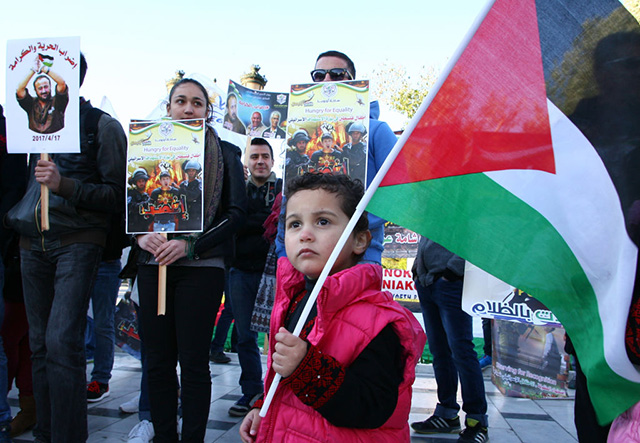
Support justice-driven, accurate and transparent news — make a quick donation to Truthout today!
Imagine you are a child between the ages of 12 and 17 years old. The army comes to your home in the middle of the night, wakes you from your bed, blindfolds you and ties your hands with plastic cuffs.
Your parents’ pleas do not stop the soldiers from roughly taking you and throwing you in their Jeep, never telling you or your parents what you are charged with or where you are going.
You arrive at a detention cell in an Israeli settlement where you are interrogated without a lawyer or family member present, and you are pressured to confess to throwing stones so you can go back home to your family. Once you sign the confession, written in a language you can’t read, you then face a military court hearing where a military judge sentences you to prison for three months, in a detention center in Israel where your family members are likely unable to visit.
This week, Congresswoman Betty McCollum and nine other members of Congress introduced a bill to ensure that US taxpayer funds do not go toward these types of abuses, which are commonplace for Palestinian children living under Israeli military occupation.
For a decade, US State Department annual country reports on Israel and the Occupied Palestinian Territory have included documentation of these conditions for Palestinian children, yet no one in Congress or the White House took action to stop these practices or hold Israeli officials accountable. In fact, the US government increased its military aid to Israel to record levels of $3.8 billion a year.
Twenty-five years of documentation by Defense for Children International-Palestine (DCIP), UNICEF, the Israeli human rights group B’tselem and Human Rights Watch show that ill treatment is “widespread, systematic, and institutionalized,” as UNICEF concluded in a 2013 report. Yet, this child abuse remains invisible to the very US public whose tax dollars are paying for it.
So, what finally causes members of Congress to recognize and act on these horrific human rights violations?
Three years ago, the small group of faith-based organizers in Chicago I am part of learned of the widespread, systematic nature of the detention and abuse of Palestinian children in Israeli military detention. We decided to do something. Partnering with DCIP, the Quaker group American Friends Service Committee — where I work — and other faith-based organizers from Presbyterian, United Church of Christ, Brethren, Mennonite, Episcopal, Methodist, Lutheran, Jewish, Muslim and secular backgrounds launched a campaign, “Israeli Military Detention: No Way to Treat a Child.” Our goal was to educate and mobilize people of conscience around the US to advocate for policies that promote equality and human rights for Palestinian children. We asked that our elected officials hold the government of Israel accountable for its mistreatment of Palestinian children.
For three years, we built a base of supporters that have organized public lectures, conferences, film events and house parties to educate people about this issue. We’ve encouraged people to share their knowledge with their elected officials and request that Israeli officials end the routine practice of arresting and detaining children in an unjust, unequal and violent system. Our efforts included petitions and “Dear Colleague” sign-on letters in Washington to raise the profile of this issue to our elected officials.
Three years ago, congressional action on these abuses seemed like a distant dream. Now it is reality.
The bill introduced in Congress this week requires the secretary of state to certify that no US funds have been used by the government of Israel to support military detention, interrogation, abuse or ill treatment of Palestinian children.
The bill further encourages the state of Israel to create a juvenile justice system that does not discriminate between the treatment of Israeli and Palestinian children and adheres to internationally recognized standards of human rights. If the current practices of detaining children continue, the Israeli government undermines any US effort to achieve a just and lasting peace between Israelis and Palestinians.
No children should be snatched from their beds in the middle of the night and subjected to the abuses of a military court system. Upholding equality, human rights and dignity is the way to treat children and all people. The bill by Congress this week is a significant step forward for all those who want to align our values with the actions — and aid monies — of our government.
Now we need the rest of Congress to act by swiftly passing this breakthrough legislation. Looking at what has been accomplished since a small group of us sat at my kitchen table three years ago, agonizing over how to end these abuses, I know this vital change is possible.
Media that fights fascism
Truthout is funded almost entirely by readers — that’s why we can speak truth to power and cut against the mainstream narrative. But independent journalists at Truthout face mounting political repression under Trump.
We rely on your support to survive McCarthyist censorship. Please make a tax-deductible one-time or monthly donation.